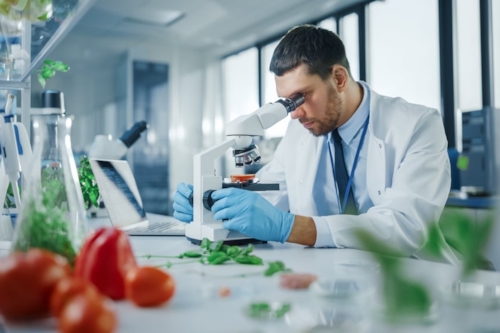
Certificación SQF
¿Qué es?
La certificación SQF asegura que una empresa cumple con altos estándares de seguridad y calidad alimentaria. Está reconocida por la Iniciativa Global de Seguridad Alimentaria (GFSI), que establece estándares internacionalmente aceptados para los sistemas de gestión de la seguridad alimentaria.
La certificación SQF se aplica a múltiples sectores de la industria alimentaria, entre ellos:
- Producción primaria (vegetal y animal)
- Fabricación de alimentos
- Fabricación de envases para alimentos
- Almacenamiento y distribución
- Venta minorista de alimentos
- Servicios de alimentación
A diferencia de otros programas reconocidos por la GFSI, la certificación SQF abarca toda la cadena de suministro, garantizando la seguridad alimentaria desde la granja hasta la mesa.
¿Cuándo es adecuado?
Es especialmente útil para empresas que desean demostrar el cumplimiento con altos estándares internacionales de inocuidad y calidad alimentaria. Algunos ejemplos de empresas que pueden aplicar son los siguientes:
- Fincas agrícolas
- Acuicultores, pescadores
- Plantas de procesamiento de carnes, lácteos, panadería, entre otros.
- Empacadoras de alimentos: fabricantes de envases primarios y secundarios, impresión o diseño de empaques
- Centros de distribución y almacenamiento
- Supermercados, mayoristas y minoristas
En resumen, aplica a cualquier empresa que desee asegurar y demostrar la inocuidad y calidad de los alimentos que produce, procesa, empaca o distribuye.
Procedimiento inicial
Para obtener la certificación, las empresas deben cumplir varios requisitos clave según el Código SQF. Estos incluyen:
- Desarrollo e implementación de un plan de Análisis de Peligros y Puntos Críticos de Control (HACCP)
- Sistema documentado de gestión de la inocuidad y la calidad alimentaria
- Cumplimiento de las Buenas Prácticas de Manufactura (BPM) o las Buenas Prácticas Agrícolas (BPA)
- Programas de capacitación de empleados para garantizar el conocimiento de la inocuidad alimentaria
- Implementación de procedimientos de trazabilidad y retirada de productos
- Auditorías internas periódicas y acciones correctivas
- Cumplimiento de los requisitos reglamentarios aplicables al producto y al tipo de instalación
Dependiendo del sector de la cadena de suministro, las empresas deben cumplir requisitos específicos descritos en el Código SQF: https://www.sqfi.com/es-mx/the-sqf-code/choose-your-code/library-of-codes
Frequently Asked Questions
What is the process for getting SQF Certified?
The process of getting SQF Certified involves several key steps designed to ensure your food safety and quality management systems meet the standards and SQF Certification requirements. Here’s a step-by-step guide to help you get started:
- Learn About the SQF Code: Familiarize yourself with the relevant SQF Food Safety Codes applicable to your industry sector.
- Register and Contact Your Certification Body: Register for SQF Certification through the SQF Assessment Data base and choose an accredited certification body to guide you through the process.
- Prepare for Your Audit: Determine the scope of your certification and document the required food safety practices. Implement the necessary changes to comply with SQF standards.
- Schedule and Conduct the Audit: An qualified auditor will evaluate your SQF system to ensure compliance with the code.
- Renew Your Certification: To maintain your certification, renew it annually with continued audits and compliance.
How long does it take to achieve SQF Certification?
The time it takes to get SQF Certification varies. It depends on the size of your operation, the complexity of your food safety systems, and how ready you are for the audit. Improving, finishing the audit, and obtaining certification usually take several months to a year. Early preparation, comprehensive training, and commitment to SQF standards can help expedite the timeline.
What are the steps involved in the SQF Certification process?
The SQF Certification process includes steps to ensure your business meets food safety and quality standards.
- Preparation: Conduct a gap analysis to assess your current food safety practices against SQF requirements.
- Implementation: Implement required changes, document your procedures, and train your staff to comply with SQF standards.
- Audit: A third-party auditor conducts an on-site audit to verify your compliance with the SQF Code.
- Certification: After you successfully complete the audit, we will award your business SQF Certification.
How often should we conduct SQF audits?
SQF Certification typically requires an annual audit to maintain certification status. These
audits are conducted by an accredited certification body and are essential for verifying that your food safety management systems continue to meet SQF standards. Maintaining annual audits helps ensure ongoing compliance and demonstrates your commitment to food safety and quality.
How can SQF Certification help me meet retailer and buyer requirements?
SQF Certification helps businesses ensure food safety and quality, meeting the needs of retailers and buyers around the world. SQF Certification helps manage risks using HACCP, ensuring your products meet industry, regulatory, and customer standards.
With specific codes tailored for various sectors of the food supply chain, SQF Certification equips your business with the tools needed to build trust with retailers and meet market demands.
How much does SQF certification cost?
The cost of SQF Certification depends on your operations' size, complexity, certification scope, and location. Expenses typically include registration fees, costs for implementation support, training, audit fees, and ongoing maintenance of your certification. To get an accurate estimate, you should consult with an accredited certification body, like Kiwa, that can provide a tailored quote based on your specific needs.
BRCGS Food Safety
Get your food business certified with BRCGS Food Safety through Kiwa. Our expert auditors ensure compliance with GFSI benchmarked standards. Request a quote today!

GFSI - Global Markets Program
Learn how the GFSI Global Markets Program by Kiwa helps businesses achieve food safety certification, reducing risks in global supply chains. Explore benefits for suppliers, regulators, and retailers.

GlobalG.A.P. certification
GLOBALG.A.P. certification with Kiwa: reduce your food safety risks, increase your transparency and support sustainable agriculture to meet customer demands.

IFS Food Certification Services
Ensure food safety and quality with IFS Food Certification from Kiwa. Our expert auditing services help organizations comply with international food safety standards. Contact us today!
